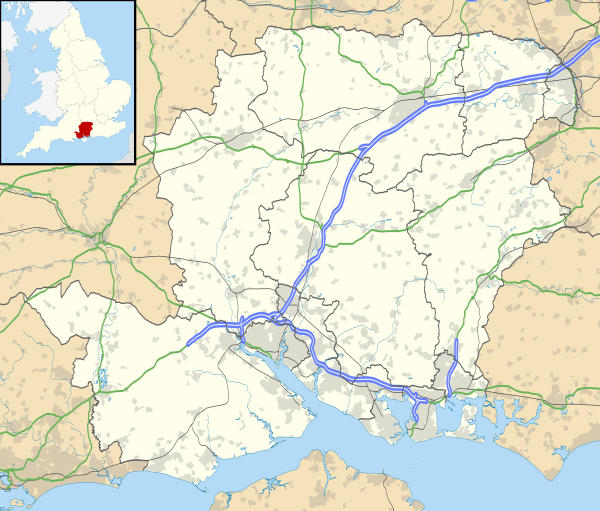Peninsula Barracks
| Peninsula Barracks | |
|---|---|
| Winchester | |
 Peninsula Barracks | |
 Peninsula Barracks Location within Hampshire | |
| Coordinates | 51°03′43″N 01°19′16″W / 51.06194°N 1.32111°WCoordinates: 51°03′43″N 01°19′16″W / 51.06194°N 1.32111°W |
| Type | Barracks |
| Site information | |
| Owner | Ministry of Defence |
| Operator |
|
| Site history | |
| Built | Early 20th Century |
| Built for | War Office |
| In use | Early 20th Century-1985 |
The Peninsula Barracks are a group of military buildings in Winchester, Hampshire.
History
The barracks, which were originally known as the Upper Barracks, Winchester, were built in the early 20th Century on the site of King's House, an unfinished palace designed by Sir Christopher Wren for Charles II which was destroyed by fire in 1894.[1] Some parts of the barracks remain Grade II listed buildings in their own right including the Green Jackets Headquarters and the Royal Green Jackets (Rifles) Museum, the Gymnasium, the Main Entrance Gate Piers, the Gates and Flanking Railings and Piers, the Royal Hussars Museum (former Militia Stores), the East Block, the Guardroom, the Chapel and Schoolroom, the Mons Block, the North Block, the Weapons Training Shed and the West Block.[2] The barracks became the depot of the King's Royal Rifle Corps and the Rifle Brigade in 1858.[3]
The barracks went on to become the regional centre for infantry training as the Green Jackets Brigade Depot in 1960.[4] The name of the barracks was changed from Upper Barracks, Winchester to Peninsula Barracks in 1964.[3] The 1st Green Jackets (43rd and 52nd) returned to the barracks on 21 April 1964, from Bushfield Camp, near Winchester, where they had moved in 1961.[5] On 22 May 1964, General Sir Gerald Lathbury, Colonel Commandant of the 1st Green Jackets (43rd and 52nd) and also Quartermaster-General to the Forces, whose responsibilities included all Army buildings, took the first passing-out parade in the rebuilt barracks.[5] Prince Richard, Duke of Gloucester, Colonel-in-Chief, 3rd Green Jackets, The Rifle Brigade, officially opened the new barracks on 28 May 1965.[6] The barracks closed in 1985 and military training was moved to Sir John Moore Barracks.[3]
In 1994 the Ministry of Defence sold most of the barracks for private flats, retaining some space for Winchester's Military Museums, a complex of museums that are grouped together but operated separately.[7]
In 2010 a new café opened at the former barracks under the name "Falling plates": the term "Falling Plates" is a derogatory name for an easy target or loss of life, that was used during the Troubles and the café owner subsequently changed the name of the cafe to "Cafe Peninsula" to avoid causing offence.[8]
References
- ↑ "Peninsular Barracks - Winchester - Hampshire - England". British Listed Buildings. Retrieved 2014-04-18.
- ↑ "Listed Buildings in Winchester, Hampshire, England". British Listed Buildings. Retrieved 2014-04-18.
- 1 2 3 "History of Peninsula Barracks" (PDF). Archived from the original on 2013-10-08. Retrieved 2014-04-18.
- ↑ "Infantry Brigade Depots (Location)". Hansard. 7 March 1958. Retrieved 10 April 2014.
- 1 2 The Gorget 1964, p. 11
- ↑ "The Green Jacket Brigade depot". Royal Green Jackets Association. Retrieved 26 July 2016.
- ↑ "Light Infantry Museum". Archived from the original on 2008-10-12. Retrieved 2014-04-18.
- ↑ "Café name is a slur on regiment, say veterans". Hampshire Chronicle. 14 June 2010. Retrieved 16 April 2017.